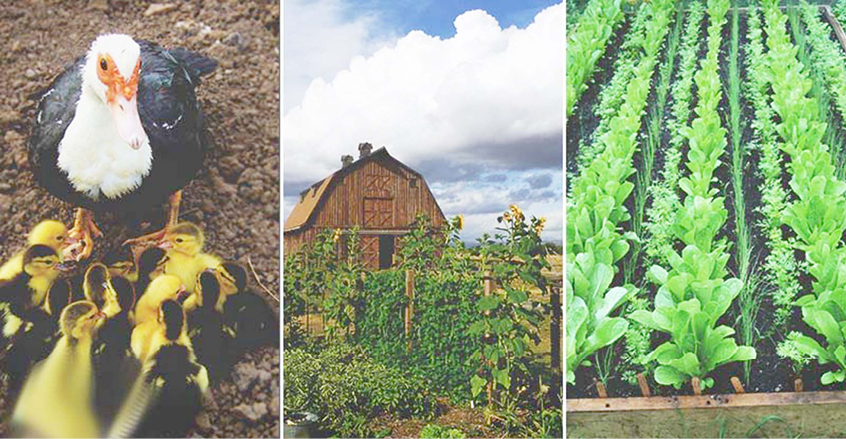Have you ever heard the term ‘hobby farm’ and wondered what it actually was?
What is the difference between a farm, a homestead, and a hobby farm?
Well, I wondered the same thing not too long ago so I began doing some research. I’d like to share with you exactly what I found out.
Then maybe you can decide exactly what type of farm of your own you’d like to create in the future.
- 10th NASS: N/Central govs back Sani Musa for dep Senate President
- Why NAHCON must review 2023 Hajj airlift plan – CSO
Here is what I found out about hobby farming.
What is a Hobby Farm?
A hobby farm is basically someone who practices self-sustainability by raising a farm. They do it for fun or to make a little extra money on the side. However, they don’t farm to earn a full-time income.
So, if you are someone who raises a flock of chickens in your backyard, a couple of goats, some fresh veggies, or anything else along those lines, then you are considered a hobby farmer.
Basically, the difference between a hobby farm, homestead, and a farm is this:
A hobby farm and homestead can be one and the same. It is all about your purpose behind your farming efforts.
Then a farm and a homestead could also be one and the same because if you farm for a full-time living, then you are no longer doing it just as a hobby or for supplemental income.
So now you know exactly what a hobby farm is. The next time you hear the term, you can be ‘in the know.’
The Pros and Cons of a Hobby Farm
I am a hobby farmer, technically. We raise our own meats, fruits, and vegetables to feed our family and make a little extra money.
However, we don’t make a full-time income from it. My husband still has a town job, and I work from home as a writer. That is our meat and potatoes.
But our farm allows us not to spend our money on food and instead use it in other areas of our lives. It is kind of nice to be able to save your paycheck for other things instead of spending it all or in part at the grocery store.
How to start a hobby farm
If you’ve read through the pros and cons and still think a hobby farm would be a great addition to your life, then congratulations! You are now part of the rest of us that just have a heartbeat for it regardless of the expense or hardship.
Here is how you create your own hobby farm:
- Research
Before you begin anything, you always need to research. Be sure to get an idea of what you’d like to grow and what animals you’d like to raise.
Then you’ll have an understanding of what they need and how much it is going to require of you. You’ll also use this time to pick out housing plans for your animals.
For instance, chickens obviously need a chicken coop. You’ll want to research and find the plans that best fit your future set-up. Then begin building the necessary structures for this adventure.
- Plant a garden
Next, you’ll want to use this research to plant a garden. A garden is a big part of becoming self-sustained.
Then you are able to harvest and preserve your own food. This will be an investment up front because you’ll need to purchase items like a canner, canning jars, and other canning supplies.
But it will save you lots of money down the road as you can preserve just about anything you would purchase in a store, yourself.
Once you have your garden planted, you are ready to move on.
- Invest in livestock
You will then want to invest in your livestock. This could be goats for milk, chickens for meat and eggs, rabbits for meat, or larger livestock like cattle, to be a meat or dairy source.
However, be sure that you are able to provide the needs for whatever animal you purchase. If you live on an acre, a cow will not be a good fit because they require an acre of pasture to sustain them.
But you could invest in a few backyard chickens. When I say a few, if you are going to have a small backyard flock, you’ll probably only want 4-5 hens, and you do not need a rooster unless you are planning on hatching your own eggs.
- Find ways to save money
Finally, you’ll want to look for ways to save money. This can mean growing fodder as a food source to help save on the feed bill.
Or you could put together a rain catchment system so you can use rain water to water your plants. You will be surprised of all of the ideas you will come up with through research and brainstorming.
Once you’ve reached this step, you just repeat the cycle again and again. Your hobby farm will transform into a fully functional farm over time, and if you have the heart for it, you will be amazed at what all you can do.
Now you know the ins and outs of hobby farming. Hopefully this information will help you in decisions you make going forward.
Source: This hybrid piece was written by Jennifer Poindexter and appeared in Hobby Farms

 Join Daily Trust WhatsApp Community For Quick Access To News and Happenings Around You.
Join Daily Trust WhatsApp Community For Quick Access To News and Happenings Around You.


